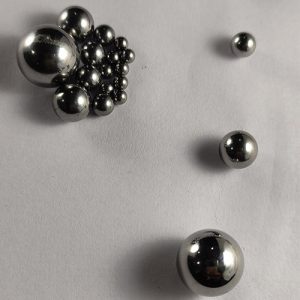
Tool Steel Balls
Tool Steel Balls by DSP Precision Products Pvt. Ltd.
Introduction
Tool steel balls are high-performance components designed to withstand extreme conditions and provide exceptional durability in various industrial applications. DSP Precision Products Pvt. Ltd., located in the Baddi Industrial Area of Himachal Pradesh, is a premier manufacturer specializing in the production of tool steel balls. These balls are crafted to meet stringent standards and are used in a wide range of applications where precision and resilience are crucial. This detailed description covers the manufacturing process, chemical composition, and size options of tool steel balls produced by DSP Precision Products Pvt. Ltd.
Company Overview
DSP Precision Products Pvt. Ltd. has established itself as a leading manufacturer in the precision engineering sector. With its facility in the Baddi Industrial Area, Himachal Pradesh, the company is known for its expertise in producing high-quality precision components, including tool steel balls. The company’s focus on technological innovation, quality control, and customer satisfaction has made it a trusted name in the industry.
What are Tool Steel Balls?
Tool steel balls are spherical components made from tool steel, a specialized type of steel that is alloyed to achieve high hardness, strength, and wear resistance. Tool steel is specifically formulated to withstand the rigorous demands of cutting, shaping, and manufacturing tools. Tool steel balls are used in various applications where exceptional hardness and durability are required, including:
- Industrial Machinery: In bearings and other mechanical components subject to high wear and stress.
- Automotive Industry: In components where high strength and precision are crucial.
- Aerospace: For applications requiring high resistance to wear and extreme conditions.
- Manufacturing: In molds and dies where high hardness is essential for shaping materials.
Manufacturing Process
DSP Precision Products Pvt. Ltd. employs a sophisticated manufacturing process to produce tool steel balls, ensuring that each ball meets the highest standards of performance and quality. The process involves several key steps:
- Raw Material Selection: The process begins with selecting high-grade tool steel. Tool steel is chosen based on its composition and properties, including high carbon content and specific alloying elements that enhance its hardness and wear resistance.
- Melting and Alloying: The selected tool steel is melted in an electric arc furnace or an induction furnace. During this stage, alloying elements such as tungsten, molybdenum, and vanadium are added to achieve the desired properties. The composition is closely monitored to ensure consistency and quality.
- Forming: The molten tool steel is poured into molds to create billets or ingots. These billets are then forged into rough ball shapes using precision machinery. Forging helps to align the grain structure of the steel, enhancing its strength and uniformity.
- Spheronization: The forged balls undergo a spheronization process, where they are ground and polished to achieve a precise spherical shape. This process involves using abrasive materials and rotating drums to remove any irregularities and achieve a high level of dimensional accuracy.
- Heat Treatment: To further enhance the hardness and mechanical properties of the balls, they undergo a heat treatment process. This involves heating the balls to a specific temperature and then quenching them rapidly. The heat treatment process is carefully controlled to achieve the desired hardness and toughness.
- Grinding and Polishing: After heat treatment, the balls are ground and polished to achieve a smooth surface finish. Precision grinding machines are used to remove any remaining imperfections, and polishing ensures a high-quality, reflective surface.
- Inspection and Quality Control: Each batch of tool steel balls undergoes rigorous inspection and quality control. This includes dimensional checks, hardness testing, and surface quality assessments. Advanced testing equipment is used to ensure that each ball meets the required specifications.
- Packaging and Delivery: Once the balls pass quality control, they are packaged in protective materials to prevent damage during transportation. The packaging is designed to keep the balls in optimal condition until they reach the customer.
Chemical Composition
The chemical composition of tool steel balls is crucial in determining their properties. Tool steel typically includes high levels of carbon and various alloying elements. The following chart provides an overview of the typical elements found in tool steel and their respective ranges:
| Element | Typical Range (%) | Role |
|---|---|---|
| Carbon (C) | 0.7 – 1.5 | Increases hardness and wear resistance; higher carbon content improves strength but can affect toughness. |
| Chromium (Cr) | 3.0 – 5.0 | Enhances hardness, wear resistance, and corrosion resistance. |
| Molybdenum (Mo) | 0.2 – 1.0 | Improves strength, toughness, and high-temperature resistance. |
| Vanadium (V) | 0.1 – 0.5 | Increases hardness and wear resistance; helps in fine grain structure. |
| Tungsten (W) | 0.5 – 2.0 | Enhances hardness and heat resistance; contributes to the overall durability of the steel. |
| Nickel (Ni) | 0.5 – 2.0 | Improves toughness and impact resistance. |
| Manganese (Mn) | 0.5 – 1.0 | Enhances hardness and strength; improves wear resistance. |
| Silicon (Si) | 0.2 – 0.4 | Improves strength and resistance to oxidation. |
| Phosphorus (P) | <0.03 | Typically minimized to avoid brittleness and reduce impact toughness. |
| Sulfur (S) | <0.03 | Minimally present to prevent the formation of sulfide inclusions, which can affect the steel’s performance. |
Size Chart
DSP Precision Products Pvt. Ltd. offers tool steel balls in various sizes to meet different application requirements. The following size chart outlines the standard sizes available:
| Diameter (mm) | Tolerance (mm) | Common Applications |
|---|---|---|
| 2.00 | ±0.01 | Precision tools, small machinery components |
| 3.00 | ±0.01 | Bearings, small industrial machinery |
| 4.00 | ±0.01 | Automotive components, small-scale manufacturing |
| 5.00 | ±0.02 | Ball bearings, conveyor systems |
| 6.00 | ±0.02 | Aerospace components, sports equipment |
| 8.00 | ±0.03 | Heavy-duty machinery, molds and dies |
| 10.00 | ±0.03 | Industrial bearings, high-load applications |
| 12.00 | ±0.05 | High-stress applications, automotive and aerospace |
| 15.00 | ±0.05 | Large machinery, heavy-duty industrial components |
| 20.00 | ±0.05 | High-performance bearings, specialized industrial equipment |
| 25.00 | ±0.05 | Heavy-duty applications, mining and construction |
Advantages of Tool Steel Balls
- Exceptional Hardness: Tool steel balls are engineered to offer superior hardness, making them ideal for applications involving high wear and stress. This hardness ensures that the balls maintain their shape and performance over extended periods.
- High Wear Resistance: The alloying elements in tool steel enhance its resistance to abrasion and wear. This property is crucial for components subjected to continuous friction and heavy loads.
- Durability: Tool steel balls are designed to withstand extreme conditions, including high temperatures and corrosive environments. This durability translates to longer service life and reduced maintenance needs.
- Precision and Consistency: DSP Precision Products Pvt. Ltd. employs advanced manufacturing techniques to ensure that each tool steel ball is produced with precise dimensions and consistent quality.
- Versatility: Tool steel balls are used in a wide range of applications, from industrial machinery to aerospace components. Their versatility makes them a valuable choice for various sectors.
Applications in Different Industries
- Industrial Machinery: Tool steel balls are used in bearings, gears, and other mechanical components that experience high levels of wear and stress. Their hardness and durability contribute to the efficient operation and longevity of machinery.
- Automotive Industry: In automotive applications, tool steel balls are used in components where high strength and precision are required. They help in improving the performance and reliability of automotive systems.
- Aerospace: Tool steel balls are utilized in aerospace components that must endure extreme conditions and stresses. Their high wear resistance and durability make them suitable for critical aerospace applications.
- Manufacturing: Tool steel balls are used in molds and dies for manufacturing processes. Their hardness and resistance to wear ensure the quality and longevity of the tools used in shaping and cutting materials.
- Mining and Construction: In the mining and construction industries, tool steel balls are employed in equipment subjected to harsh conditions and heavy loads. Their strength and durability make them ideal for these demanding environments.
Conclusion
DSP Precision Products Pvt. Ltd. excels in the manufacturing of tool steel balls, leveraging advanced technology and a commitment to quality to produce high-performance components. The company’s tool steel balls are characterized by exceptional hardness, wear resistance, and durability, making them suitable for a wide range of applications. By maintaining rigorous quality control and offering a variety of sizes, DSP Precision Products Pvt. Ltd. ensures that its tool steel balls meet the demanding requirements of various industries. With a focus on precision and performance, DSP Precision Products Pvt. Ltd. continues to set the standard for excellence in tool steel ball manufacturing.



